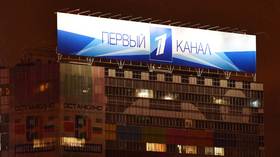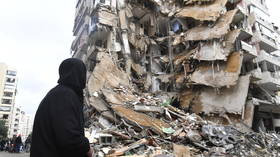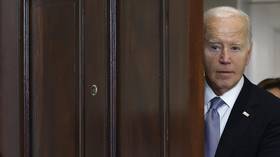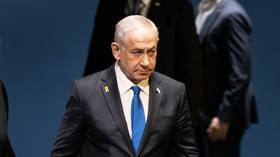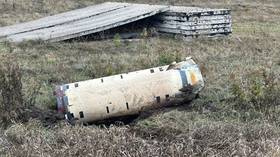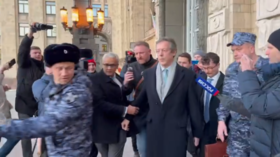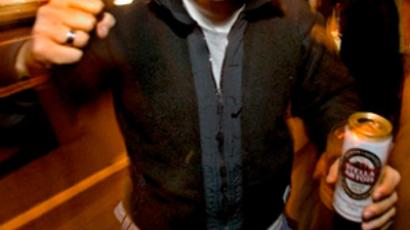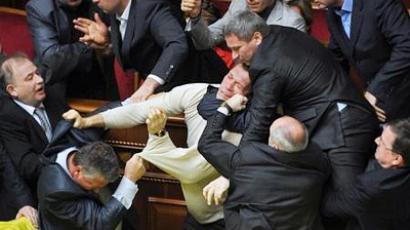Russian MPs brawl over monument to 19th-century Chechen conflict
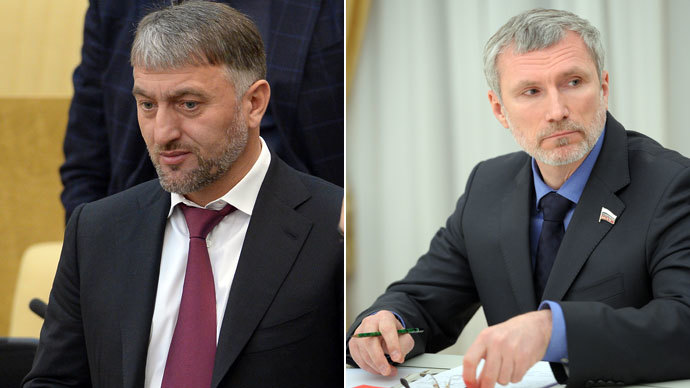
A Russian nationalist party leader and a Duma MP from Chechnya began a brawl after failing to settle an argument over a monument to the 19th-century war in the Caucasus. The fight ended abruptly after the Chechen politician dropped a golden pistol.
The two men were the chairman of the recently re-registered nationalist party Rodina (Motherland), Aleksey Zhuravlev , and Adam Delimkhanov, an MP from the majority United Russia party.
Technically, Zhuravlev also sits in parliament on the United Russia ticket – he was elected as a member of the United Popular Front movement which supported the ruling party at the last elections in exchange for a share of representation.
The brawl itself took place at about 6pm on Tuesday in an elevator lobby of the State Duma building in central Moscow.
The cause and background of the conflict were presented by Zhuravlev, who told business daily Kommersant that he and Delimkanov had previously agreed to meet and discuss the recent controversy over the monument erected near the Chechen village of Dadi-Yurt.
The monument, which was opened personally by the head of the Chechen Republic Ramzan Kadyrov in September this year, is dedicated to the memory of those who fought against the Tsarist Russian army in 1819.
It especially glorifies the heroism of 46 girls who, according to local chronicles and legends, were taken prisoner, but jumped into a mountain river from a bridge taking several Russian soldiers with them, killing themselves and their enemies.
The monument caused a wave of criticism in Russia. Journalists and historians doubted the veracity of the original story and the Officers of Russia NGO insisted on retaliation by installing a monument to General Aleksey Yermolov – the commander of Russian forces in the Caucasus War.
Also in September Aleksey Zhuravlyov addressed Russia’s Prosecutor General with an official parliamentary request to study the legality of the Dadi-Yurt monument. He wrote that the wide resonance around the story raised suspicions that the memorial was stirring up ethnic hatred –a criminal offense in Russia.
“The attempts to revalue and praise some distant and ambivalent history pages are fertile soil for the seeds of extremism and separatist moods,” Zhuravlyov wrote.
When the two MPs met in the State Duma elevator hall on Tuesday afternoon, Delimkhanov started shouting threats, saying that Zhuravlev should not have written any request and that “everything would now end badly,” Zhuravlev told Kommersant. Also, according to the Rodina head, the Chechen MP attempted to punch him in the head and after this a brawl started between the politicians with involvement of their aides and bodyguards.
The incident ended in a strange way.
“At some point Adam Suleymanovich [Delimkhanov] dropped a golden pistol – I have no idea from where – and we decided to stop all actions against him,” Zhuravlev said.
However, some of the participants of the brawl were injured and had to receive first aid from an ambulance team. Rodina’s press secretary has told ITAR-TASS that one of Zhuravlev’s friends, who attempted to stop the fight, had several teeth broken, but refused to be taken to a hospital.
The day after the incident it was considered by the State Duma committee for Ethics, but its members refused to issue an official appraisal. Lower house Speaker Sergey Naryshkin told the press that participation in a fistfight was not worthy of someone in the position of a parliamentarian, adding that law enforcers would now deal with the fight.
“A line has been crossed,” he said, hinting at potentially
serious consequences for those involved in the conflict.
On Wednesday afternoon Interfax reported that the two legislators had settled their conflict.
The announcement was made after Zhuravlev and Delimkhanov consulted with Naryshkin and the chairman of United Russia’s parliamentary caucus Vladimir Vasilyev.
Also on Wednesday, the head of the Chechen Republic, Ramzan Kadyrov, told reporters that in his view the conflict between the two MPs was not serious.
“It was a misunderstanding, nothing else then a heated
argument between two men,” he said. “All this speculation
is worthless and the topic is being artificially inflated by
external enemies who seek to cause a discord between members of
one parliamentary caucus.”


